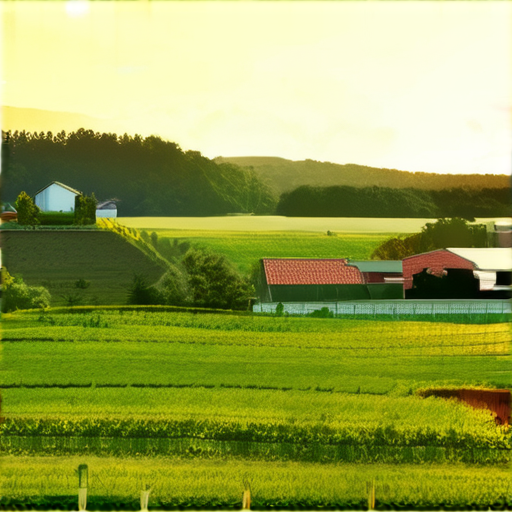Farming practices have evolved significantly over the years, with many farmers adopting sustainable methods to improve soil health and reduce environmental impact. One innovative approach gaining popularity is the use of biochar, a type of charcoal made from organic materials like wood or agricultural waste. By understanding the benefits and applications of biochar in farming, producers can unlock its full potential and reap numerous advantages, including improved soil fertility, increased crop yields, and enhanced water retention.

What is the Use of Biochar in Farming?
Biochar plays a vital role in modern farming practices due to its unique properties.
-
Increase Water Holding Capacity
-
Prevent Nutrient Losses
-
Structure for Beneficial Microorganisms
-
Improved Plant Growth and Crop Yield
Biochar helps retain moisture in the soil, reducing the need for frequent irrigation and minimizing water waste.
By preventing leaching and runoff, biochar ensures that essential nutrients remain available to plants, promoting healthy growth and development.
The porous nature of biochar creates a habitat for beneficial microbes, which contribute to soil fertility and overall ecosystem balance.
The combination of increased water retention, reduced nutrient loss, and a thriving microbial community leads to improved plant health and increased crop yields.
Benefits of Using Biochar in Farming
-
Sustainable Agriculture Practices
-
Climate Change Mitigation
-
Soil Erosion Prevention
Biochar-based farming methods promote sustainable agriculture by reducing the need for synthetic fertilizers and minimizing environmental impact.
By sequestering carbon in soils, biochar contributes to global efforts to combat climate change and reduce greenhouse gas emissions.
The addition of biochar to soils helps prevent erosion, preserving fertile land and protecting against soil degradation.
Best Practices for Implementing Biochar in Farming
-
Select High-Quality Biochar
-
Adequate Application Rates
-
Mix with Other Soil Amendments
Choose biochar produced through controlled pyrolysis processes to ensure optimal quality and effectiveness.
Follow recommended application rates to avoid overloading soils with excessive amounts of biochar.
Combine biochar with other organic amendments to create a balanced and fertile soil environment.
Conclusion
Biochar offers numerous benefits for farmers seeking to adopt sustainable and environmentally friendly practices.
By incorporating biochar into their operations, farmers can improve soil health, increase crop yields, and contribute to a more sustainable food system.
Negatives of Biochar
Biochar has several potential drawbacks that need to be considered.
-
Soil pH Imbalance
-
Water Pollution
-
Carbon Sequestration Limitations
-
Economic and Logistical Challenges
-
Potential Health Risks
When added to soil, biochar can increase its pH level, potentially leading to nutrient deficiencies and reduced plant growth.
The production of biochar can result in water pollution due to the release of heavy metals and other contaminants during the pyrolysis process.
While biochar can store carbon in the soil, its effectiveness in sequestering carbon is limited by factors such as soil type, temperature, and moisture levels.
The large-scale production and distribution of biochar can be economically and logistically challenging, particularly in developing countries.
The inhalation of particulate matter and volatile organic compounds during biochar production can pose health risks to workers and nearby communities.
It is essential to carefully evaluate these potential drawbacks and consider alternative approaches to biochar production and application.

Why is Biochar Controversial?
Biochar has been gaining attention in recent years due to its potential benefits for soil health and carbon sequestration.
-
The controversy surrounding biochar stems from concerns over its potential impact on soil fertility and ecosystem balance.
-
Some studies suggest that high doses of biochar can lead to reduced microbial activity, decreased nutrient cycling, and increased soil pH levels.
-
Additionally, there are concerns about the large-scale production of biochar and its potential contribution to greenhouse gas emissions during transportation and processing.
Key Concerns:
-
Negative impacts on soil microorganisms and nutrient cycling
-
Potential increase in soil pH levels and reduced fertility
-
Concerns over large-scale production and transportation emissions
Counterarguments:
-
Many experts argue that these concerns can be mitigated through careful application rates and monitoring of soil conditions.
-
Others point out that biochar can actually enhance soil fertility and support beneficial microorganisms when applied correctly.
-
Furthermore, some researchers believe that the benefits of biochar in sequestering carbon and reducing greenhouse gas emissions outweigh the potential risks.
Conclusion:
The debate surrounding biochar highlights the need for further research and careful consideration of its potential impacts on ecosystems and human societies.
As we continue to explore the possibilities of biochar, it is essential to weigh the benefits against the risks and strive for responsible and sustainable practices.

Is Biochar Better Than Fertilizer?
When it comes to improving soil health and fertility, two popular options come to mind: biochar and fertilizer. While both have their benefits, biochar stands out as a more sustainable and long-term solution.
- Sustainable Soil Health: Biochar is made from organic materials that are heated in the absence of oxygen, resulting in a highly porous and stable carbon-rich substance. This unique composition allows biochar to attract and retain nutrients in the soil, reducing the need for frequent fertilizations.
- Reduced Fertilizer Requirements: By minimizing the need for synthetic fertilizers, biochar helps mitigate soil degradation and promotes a healthier ecosystem. This approach also reduces the risk of nutrient imbalances and water pollution associated with excessive fertilizer use.
- Long-Term Nutrient Retention: Unlike traditional fertilizers, which may leach away quickly, biochar retains nutrients for extended periods, supporting plant growth and development over time.
Benefits of Using Biochar Over Fertilizer
- Improved Soil Structure: Biochar enhances soil porosity, allowing roots to grow deeper and promoting better water infiltration and aeration.
- Increased Crop Yields: By retaining essential nutrients, biochar supports healthy plant growth, leading to increased crop yields and improved food security.
- Carbon Sequestration: Biochar acts as a carbon sink, storing atmospheric CO2 and mitigating climate change.
Conclusion
In conclusion, biochar offers a more sustainable and effective alternative to traditional fertilizers. Its ability to retain nutrients, promote soil health, and support carbon sequestration makes it an attractive option for farmers, gardeners, and environmentally conscious individuals alike.
When Not to Use Biochar
Biochar has numerous benefits for the environment and agriculture, but there are certain situations where its use may not be suitable.
-
High pH Levels
- Existing Ideal Soil pH: Adding biochar with a high pH can disrupt the delicate balance of the soil ecosystem, potentially harming beneficial microorganisms and affecting nutrient availability.
- Ericaceous Plants: These plants thrive in acidic conditions and may struggle to adapt to the increased pH levels caused by biochar, leading to reduced growth and productivity.
-
Soil Type and Composition
- Heavy Clay Soils: Biochar may not be effective in heavy clay soils, which can become waterlogged and prevent the biochar from functioning optimally.
- Sandy Soils: In sandy soils, biochar may not provide sufficient structure and retention capabilities, making it less effective.
-
Contamination Risks
- Pollutants and Heavy Metals: Biochar may accumulate pollutants and heavy metals, which can leach into the soil and contaminate groundwater.
- Pathogens and Microorganisms: Biochar can harbor pathogens and microorganisms, potentially spreading disease and disrupting the soil food web.
-
Lack of Proper Application
- Inconsistent Mixing: Failing to mix biochar evenly throughout the soil can result in uneven distribution and reduced effectiveness.
- Insufficient Quantity: Using too little biochar may not provide sufficient benefits, while excessive amounts can lead to clogging and reduced soil porosity.
Biochar with a high pH level, typically above 7 or alkaline, can cause problems in situations where a rise in soil pH is undesirable.
The effectiveness of biochar depends on the type of soil and its composition.
Biochar can absorb contaminants from the surrounding environment, posing risks to human health and the ecosystem.
Inadequate application methods can negate the benefits of biochar and lead to negative consequences.

Why Biochar is So Expensive
Biochar is currently expensive to make in the US due to several factors.
-
High Transportation Costs
-
Limited Production Capacity
-
Energy Intensity of Pyrolysis Process
-
Raw Material Costs
-
Scalability Challenges
The cost of shipping large amounts of biomass to fewer than 50 small-scale production facilities in the country contributes significantly to the high price of biochar.
The scarcity of production facilities capable of producing high-quality biochar further drives up costs.
The energy-intensive nature of the pyrolysis process required to produce biochar adds to its expense.
The cost of raw materials, such as agricultural waste and forestry residues, also plays a significant role in determining the final price of biochar.
The difficulty in scaling up biochar production to meet increasing demand has led to higher prices.
However, efforts are underway to increase production capacity, improve efficiency, and reduce costs, making biochar a more viable option for carbon sequestration and soil remediation.
As the demand for biochar continues to grow, we expect to see improvements in its affordability and accessibility.
At Pyrolysium, we’re committed to making sustainable living and eco-friendly technologies accessible to everyone.
We believe that by working together, we can create a more environmentally conscious world, one step at a time.

0 Comments